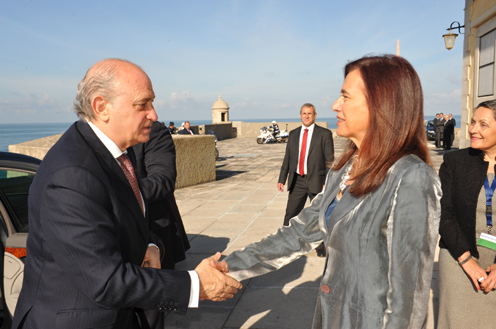G-4 meeting in Lisbon (Portugal)
G-4 ministers agree to offer faster, more operational responses to common problems and increase police cooperation
News - 2015.4.28
At the meeting, the third such event since the G-4 was set up in early 2013, the ministers discussed various issues related to the management of migratory flows, the fight against drug trafficking, the fight against terrorism and police cooperation.
The Minister for Home Affairs, Jorge Fernández Díaz, told his G-4 partners that Spain believes it is vitally important that the fight against immigration be made one of the overarching priorities of the G-4. In this regard, Jorge Fernández Díaz advocated the need to identify specific measures on migration, and the need for well-designed, well-financed and well-executed projects to combat the criminal networks involved in people trafficking.
Jorge Fernández Díaz defended the importance of the EU Mobility Partnership with Morocco and said that Spain believes "it is essential that this agreement becomes an instrument of great importance for strengthening cooperation with a country, such as Morocco, which is working effectively with the European Union in terms of the migration issue".
He then went on to stress that, in terms of such issues as the asylum regulations and regularisation processes, Spain has worked with Morocco on the development of this new policy since the very outset.
In his speech, the Spanish Minister for Home Affairs said that now is the time to implement new projects capable of "showing people that work is being done to resolve common challenges".
Fight against drug trafficking
The G-4 home affairs ministers agreed to move forward on the development of common and effective mechanisms to combat drug trafficking by air and its modus operandi.
In this regard, the Minister for Home Affairs, Jorge Fernández Díaz, highlighted the boost provided by the Task Force on Drug Trafficking that pushes for increased cooperation to eliminate drug trafficking by air in the Strait of Gibraltar under the Telos Plan. The Spanish minister explained that this plan, led by the Spanish Guardia Civil, represents "a border surveillance and counter-drug trafficking coordination model that is open to cooperation from all G-4 members".
The home affairs ministers meeting on Tuesday in Lisbon announced a special meeting on this topic at some point this year, to foster cooperation between Portugal, Spain, France and Morocco, in the fight against drug trafficking under the Telos Plan.
The G-4 ministers also discussed drug trafficking by sea, which has not only increased but diversified in terms of modus operandi as it no longer only takes place on merchant or fishing vessels but now also on yachts, container ships and speed boats. In the Strait of Gibraltar, traffickers have even been known to use jet skis.
In this regard, Jorge Fernández Díaz stressed that the entry of drugs by sea into the Iberian Peninsula is being prevented by the work carried out by the law enforcement agencies with support from the Spanish SIVE and the Portuguese SIVIC. Jorge Fernández Díaz explained that this has forced drug traffickers to change their transport routes and focus on the "Eastern Route" for drug trafficking in the Mediterranean.
As regards drug trafficking by land between Spain and France, Jorge Fernández Díaz stressed that the "Three-Year Plan to Combat Drugs" signed by the two countries is producing highly positive results and has managed to reduce drug trafficking between the two countries. Jorge Fernández Díaz said that bilateral cooperation has been expanded into new areas and instruments, forcing drug traffickers to seek alternative routes in light of this plan's effectiveness.
Fight against terrorism
During the course of this international forum, the G-4 ministers agreed to strengthen the exchange of information and best practices, joint efforts to avoid the justification of terrorism and self-radicalisation in the Internet, as well as increased cooperation to detect travel by potential terrorists, especially children.
Jorge Fernández Díaz said that Spain has launched initiatives aimed at realising the measures adopted by the G-4. In this regard, said the Spanish Minister for Home Affairs, "Spain has strengthened the channels of communication for the exchange of information through the Centre for Police Cooperation in Algeciras, where French and Portuguese Liaison Officers are already working alongside the law enforcement agencies of Spain and Morocco".
Jorge Fernández Díaz stressed that Spain places great importance to the ongoing nature of the "Euromed Police Programme" as a fundamental instrument for not only strengthening cooperation between the four countries on specialised police training in the fight against terrorism but also with other States taking part in this programme.
The Minister for Home Affairs told his G-4 colleagues that Spain has, for some time, been adopting measures to prevent the departure of terrorist combatants and neutralise the threat posed by returning combatants, as well as arrest terrorist combatants. Since 2004, 123 international counter-terrorism operations have been carried out in Spain, leading to a total of 566 arrests.





